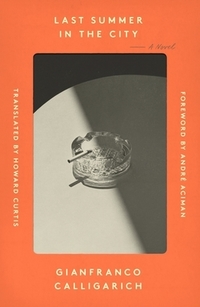Last Summer in the City by Gianfranco Calligarich
 Monday, August 9, 2021 at 7:47AM
Monday, August 9, 2021 at 7:47AM 
First published in Italy in 1973; published in translation by Farrar, Straus and Giroux on August 10, 2021
Last Summer in the City was rejected by several publishers before it found a home and earned excellent reviews in the Italian press. Then it dropped out of sight until it was republished in Italy in 2016. It’s easy to understand why so many publishers initially rejected it. The first half tells a story that seems mundane. I’m guessing editors stopped reading and moved on to the next submission before they understood the book’s value. By the second half, the story gains significance from the cumulative weight of small events. The ending is something of a shock.
Last Summer in the City tells the story of a 29-year-old man who, finally realizing that he needs to be an adult, understands that he isn’t equipped for adulthood. Leo Gazzara narrates an empty year in his life. Leo is in Rome. He reads constantly and tries without success to write fiction. He scrapes by without a job, moving from hotel to hotel until he arranges to stay in the apartment of a couple who will be working in Mexico. He moves from woman to woman until he meets Arianna, an infuriating woman with whom he falls in love. Arianna entices him and pushes him away, always appearing to want the opposite of whatever Leo wants.
Leo drinks away raucous evenings with his friend Graziano, following a lifestyle that seems likely to doom them both. Graziano drinks even more than Leo, can’t satisfy his wealthy wife, and like all men, has a crush on Arianna. Leo and Graziano set out to write a screenplay about a man who kills his father, thinking that Graziano’s wife will finance the film. The only virtue of their plan is that they drink a bit less while they’re writing.
Leo eventually finds and loses a job before taking a position at a newspaper, transcribing stories without doing any reporting of his own, earning Arianna’s disappointment and adding to his own sense of frustration about a life that seems to be going nowhere. Arianna’s continued flirtation and occasional declarations of love only add to Leo’s gloom, coupled with the knowledge that Arianna is sleeping with a wealthy but untalented painter.
As a writer, Leo comments frequently upon writers. As an avid reader, he also comments upon readers, quoting Borges’ remark that good readers are even more rare than good writers. I was more taken by Leo’s observation that a reader’s perception of a book depends upon the reader’s mood during the reading process — a mood that is external to the act of reading and influenced by current experience. “A book that struck you as banal on a first reading may dazzle you on a second simply because in the meantime you suffered some kind of heartbreak, or you took a journey, or you fell in love.”
Leo has a love/hate relationship with Rome. “She’s not so much a city as a wild beast hidden in some secret part of you. There can be no half measures with her, either she’s the love of your life or you have to leave her, because that’s what the tender beast demands, to be loved.” The same description might apply to Arianna.
None of the characters in Last Summer in the City are happy. The novel might signal that we live in an unhappy world, that nothing can make us happy because the things we desire are all superficial, that we are alone “in the middle of this vast, terrible world” with no idea how to give our lives meaning. These are not happy thoughts, but they set up a surprising ending that in retrospect seems inevitable given the gloom that precedes it.
As it nears the end, Last Summer in the City seems like a belated coming-of-age novel, the story of a man entering the middle stage of life who is accepting the challenge to find a purpose. It is, at least, the story of a man who finds the courage to make a decision about his future. The book is depressing and might not appeal to readers who want books to be upbeat and life-affirming. Not all people view life from an optimistic perspective. Last Summer in the City illustrates how an intelligent individual might come to embrace a view of life that most people reject. Gianfranco Calligarich’s ability to put the reader inside the head of such a person explains the novel’s literary value, while the depressing tone explains why the story did not earn lasting popularity after its initial publication.
RECOMMENDED